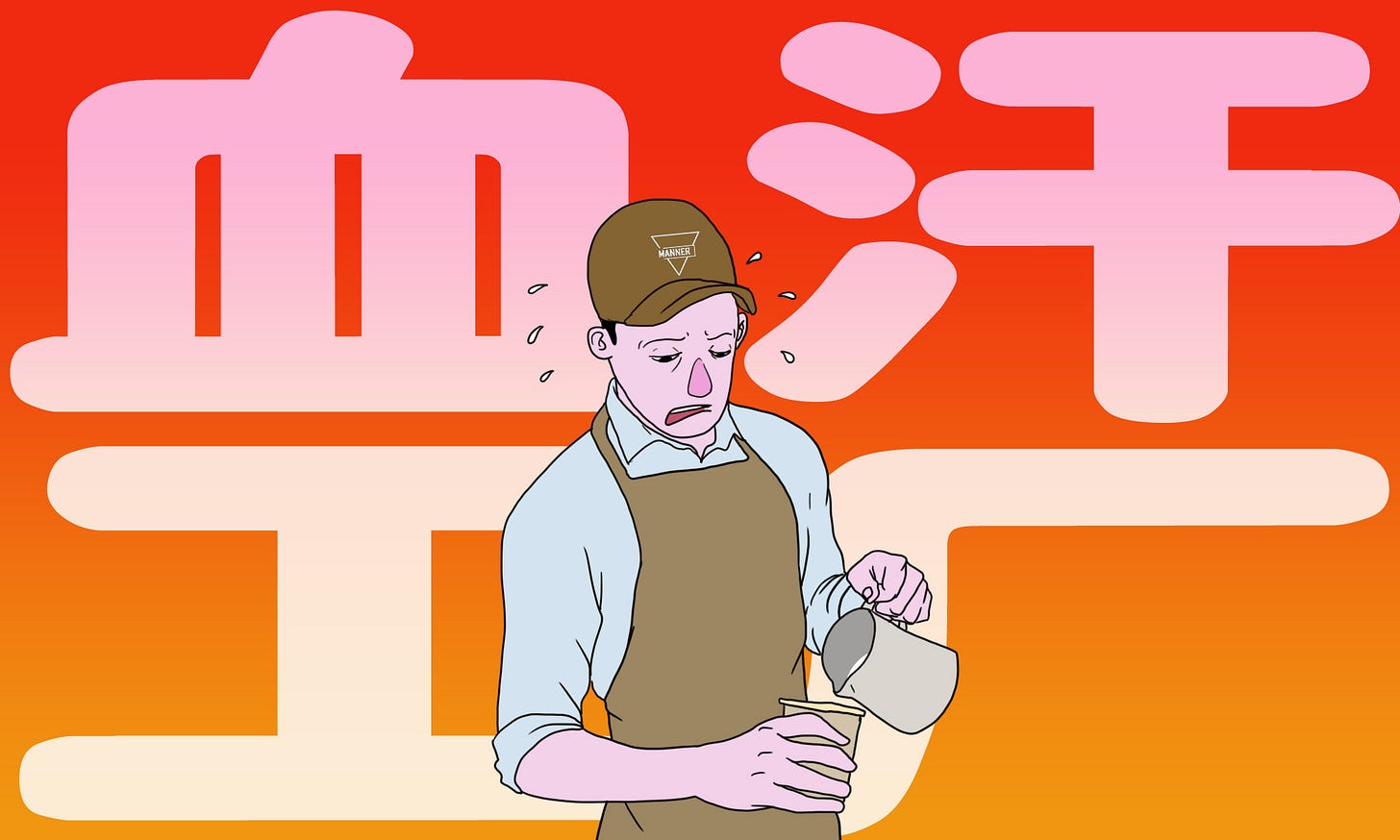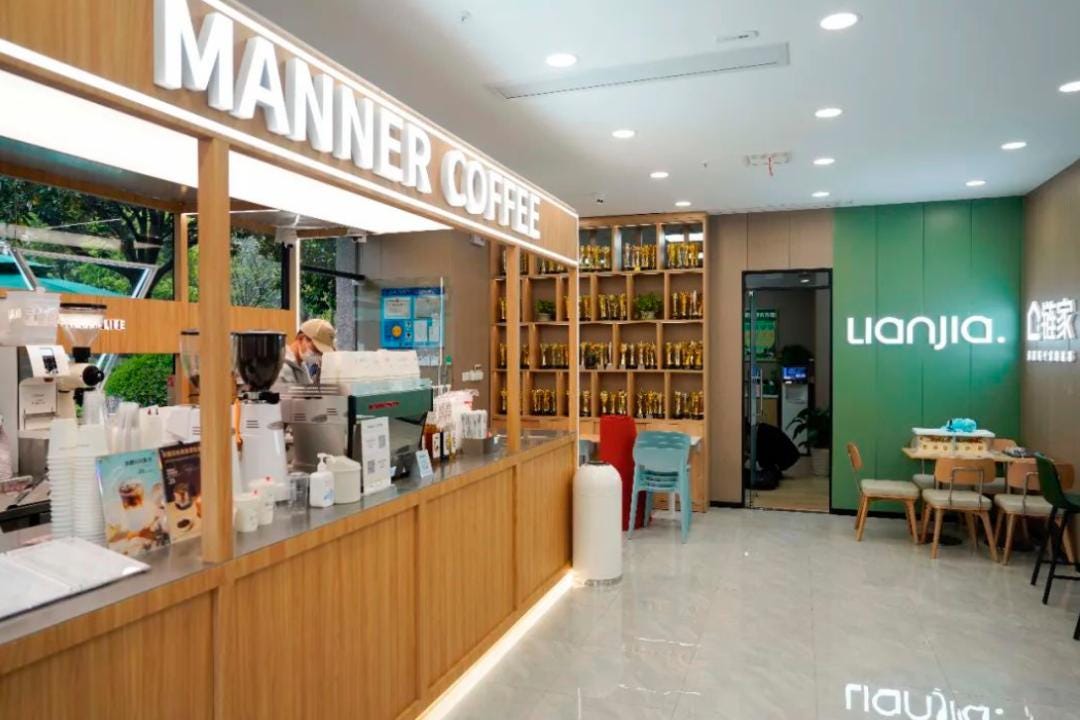Welcome to RealTime Mandarin—a multimedia resource to immerse you in the latest Chinese language trends, inspire you to practice and improve your Mandarin every week, and empower you to communicate with confidence.
Subscribe now to get the next issue straight to your inbox!
Clashes between staff and customers at different Shanghai branches of Manner Coffee have hit hot search lists, with security camera footage of the incidents going viral on social media.
Manner Coffee is a rapidly growing coffee chain in China.
Founded in 2015 in Shanghai, Manner's aggressive growth has been fueled by venture investment pouring into the business since 2018.
By 2021, what had started as a single 2 sq m take-away "hole in the wall" cafe, had become a business with a valuation of over 15 billion yuan (over $2 billion dollars).
In October 2023, Manner announced the opening of its 1,000th store. And this year, its expansion is even more aggressive, with a goal to open another 1,000 stores by the end of 2024.
But that incredible growth story has hit headwinds this week.
There were three high profile clashes between Manner staff and customers which all happened on the same day, Monday 17th June.
In one incident, a customer is seen hurrying a barista for her order, threatening to complain about slow service. The barista quickly became emotional, and started yelling at the customer uncontrollably repeating the words "file a complaint if you want" (你投诉呀).
She went on to throw a cup of coffee powder in the customer's face, and continuing in her rage:
The employee, once again losing her control, threw the coffee powder in her own face and shouted at the customer: "I ask you, is it fair or not?! Is it fair or not?!"
随后,该员工又将手中的咖啡粉泼向自己,情绪再度失控并质问顾客:“我问你公不公平?!公平不公平?!” [3]
In another Manner Coffee shop, also in Shanghai, a customer is seen nagging the barista to complete her order first because she had a plane to catch. The barista responded calmly, but the customer continued to push and quickly became aggressive. She started to film him with her mobile phone, demanding to know his name. The confrontation quickly escalated into a physical scuffle in the shop.
Footage of another confrontation on the same day was also circulated widely on social media.
Manner released a statement apologising for the incidents, confirming the female barista who had thrown the coffee powder had been sacked, and the male barista had been disciplined and had come to mutual settlement with the female customer.
Despite the excessive and disturbing aggression on show in the footage, the commentary on social media quickly shifted to the working conditions in Manner Coffee.
What looks like a conflict between the barista and the customer, is a confrontation between employees providing a service and algorithms controlling them, as well as a standoff between consumers and the reality of consumption.
这看起来是咖啡师和顾客的冲突,但也是服务从业人员和算法机器的对抗,是消费者与消费真相的对垒。[1]
Three phrases cut through all the coverage and discussions of this news story, capturing the essence of the deeper issues at Manner Coffee, and more broadly in what it can be like to work in China's service sector.
The three phrases are “sweatshop”, “involution”, and “cattle and horses”.
1. “Sweatshop” (血汗工厂 xuè hàn gōng chǎng)
According to interviews with current and former employees, working conditions at Manner are intense, with long shifts and virtually no breaks.
Employees are expected to work overtime on weekends, and must be ready at any time to be dispatched to any store by the company.
Manner has also cut its staff numbers as it expanded.
That means, often a Manner barista is a one-person team, with a daily sales target of 5,000 yuan, making up to 333 cups of coffee per day, and working a shift which could be from 7am to 10pm.
But their job is much more than brewing coffee.
Baristas are also responsible for cleaning, managing the cash register, processing orders, and providing customer service. Additionally, baristas scheduled for early and late shifts are also responsible for opening and closing stores.
They are also subjected to written warnings and sacking if they receive complaints from customers.
So it's no surprise that these incidents seen in Shanghai last week are a consequence of highly pressurised "sweatshop" working conditions:
Over the years, Manner itself has increasingly become a sweatshop for its employees.
几年过去,Manner自己也变得越来越像打工人的血汗工厂。
2. “Involuted competition” (内卷 nèi juǎn)
“Involution” is a phrase we have discussed many times in this newsletter, and was one of the top 10 phrases of the year in China in 2020.
We translate “involution” as “destructive competition”.
The pressures on Manner are a consequence of the highly competitive and "involuted" environment it is operating in:
The Chinese coffee industry has changed a lot in recent years. Competition has become intensely fierce, leading to price wars. To survive, companies must compete on price, while having extremely low margins and high costs.
Manner所处的中国咖啡行业环境已经在这些年发生了巨大的变化。一方面,竞争高度白热化,伴随着低价战,想要活下来的企业普遍面临毛利率极度压缩、成本高企的问题。[2]
One phrase which comes up a lot in discussions of the involution in China’s coffee sector is “involuted pricing competition” (卷低价 juǎn dī jià), which could also be translated as "a race to the bottom on price".
So, to compete, the company must squeeze its margins and its employees, by reducing staff numbers, and by making ever-increasing demands of those who remain. Manner does this through algorithms and computerised management systems where even staff toilet breaks are restricted and timed by their systems.
Those employees have to work harder and harder to meet expectations, to the point of collapse, as we have seen in Shanghai over the last week.
And that’s why we translate “involution” as “destructive competition”.
3. “Workhorse” (牛马 niú mǎ)
Many employees at Manner say they feel like “cattle and horses” (牛马), which in English translates as “workhorse”.
This is a phrase which has become popular this year, and one we discussed recently in the tragic suicide of a student doctor in March this year. That poor doctor, and many employees at Manner, feel exploited and treated like animals.
By contrast, the founder of Manner is on his way to becoming one of the richest people in China, worth over $1 billion dollars:
Manner's Founder has a net worth of billions, while the employees refer to themselves as "workhorses". It's both laughable and tragic.
老板身家几十亿,店员却自称是“牛马”,这一幕看着多么可笑与可悲![4]
So, is it the baristas who should be disciplined, or the company?
Perhaps Manner's founder, 韩玉龙 Hán Yùlóng needs a wake-up call like JD's Richard Liu?
Or possibly worse….
So, that's what we're exploring this week!
Favourite Five
1. 压榨 yā zhà
exploit, squeeze
又想开源节流,那只能压榨员工,尽量控制人工成本 - If you want to increase income and reduce expenditure at the same time, the only way to do it is to exploit employees and reduce labour costs as much as possible. [4]
2. 杀出重围 shā chū chóng wéi
break through, beat the competition
品牌们还需要通过疯狂扩张规模来杀出重围 - To beat the competition, brands still need to crazily scale their business. [2]
More: Zoe discusses this phrase in the Member Podcast!
3. 血汗工厂 xuè hàn gōng chǎng
sweatshop
几年过去,Manner自己也变得越来越像打工人的血汗工厂 - Over the years, Manner itself has increasingly become a sweatshop for its employees.[3]
More: Read more about this phrase in the Sinica Phrase of the Week tomorrow.
Related:
血汗钱
流水线 liú shuǐ xiàn - assembly line
4. 身心疲惫 shēn xīn pí bèi
exhausted, physically and mentally fatigued
如此高强度的工作本就令人身心疲惫,这个时候他们还得被顾客各种“催单” - Such intense workload is exhausting, and at the same time they also have to deal with being rushed by customers. [4]
5. 达摩克利斯之剑 dá mó kè lì sī zhī jiàn
an ever-present risk
上述多方压力,就像悬在中国咖啡行业头上的达摩克利斯之剑 - These pressures are like the Sword of Damocles hanging over China's coffee industry. [2]
Note: The phrase has come up a lot this year, including in this recent newsletter about how JD founder, Richard Liu, upset his employees.
Consuming the Conversation
Useful words
6. 对垒 duì lěi
confrontation, standoff
这看起来是咖啡师和顾客的冲突,但也是服务从业人员和算法机器的对抗,是消费者与消费真相的对垒 - This seems to be a conflict between the barista and the customer, but it is also a confrontation between service providers and algorithmsic systems, as well as a standoff between consumers and the reality of consumption. [1]
Related:
争执 zhēng zhí - conflict
厮打 sī dǎ - fight
掌掴 zhǎng guó - slap in the face
口角 kǒu jiǎo - quarrel, verbal altercation
肢体冲突 zhī tǐ chōng tū - physical conflict
7. 催单 cuī dān
rush an order
两名员工之所以会与顾客起冲突都是因为顾客频繁“催单” - The reason behind the conflicts between two employees and their customers was that the customers often rushed their orders. [4]
8. 牛马 niú mǎ
workhorse
只有上海总部办公室的伙伴才是真正的伙伴,门店的伙伴不是伙伴,是牛马 - Only those working in the Shanghai headquarters are real partners; others in the stores are not partners - they are workhorses. [3]
Note: This is an early candidate for one of our phrases of 2024. We discussed it in a recent newsletter, the tragic case of an overworked doctor.
9. 跋扈 bá hù
arrogant, overbearing
导致服务员越来越卑微,顾客越来越跋扈 - As a result, the waiters have become more insignificant and the customers more overbearing. [1]
10. 畸形 jī xíng
deformed, abnormal
需要为此负起责任的,更应该是一个在高速扩张与极致效率的重压下,已经畸形的运行系统 - The responsibility should be borne by the system that has become distorted under the pressure of rapid expansion and an extreme focus on efficiency. [3]
Three-character phrases
11. 倒苦水 dào kǔ shuǐ
complain, vent grievances
当我们问及消费者催单情况时,连锁咖啡店店员更是大倒苦水 - When we asked about customers rushing orders, baristas at coffee chains vented their grievances. [1]
12. 导火索 dǎo huǒ suǒ
catalyst, trigger
Manner 咖啡师和顾客的导火索,在于「这杯咖啡等了超过 8 分钟」 - The trigger for the conflict between the Manner barista and the customer was that "this cup of coffee took more than 8 minutes." [1]
13. 史诗级 shǐ shī jí
epic; extremely















